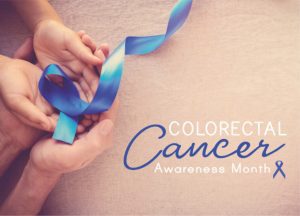 March is colorectal cancer awareness month, shining a spotlight on an insidious disease that will be diagnosed in an estimated 151,030 adults in the US this year.1
March is colorectal cancer awareness month, shining a spotlight on an insidious disease that will be diagnosed in an estimated 151,030 adults in the US this year.1
Sharon M, of Citrus County, recently went to the doctor for what she thought were hemorrhoids, only to find out that her discomfort was due to stage 4 colorectal cancer.
“Up to the day where I had my colonoscopy, I was still thinking my pain was hemorrhoid-related; however, the gastroenterologist told me I had tumors and that I needed to see a cancer doctor right away,” said Sharon.
Colorectal cancer starts in the lining of the colon or rectum as small clumps of cells called polyps, which can slowly become cancerous tumors over time, depending on the type of polyp formed.
Some risk factors make you more susceptible to developing the disease, namely advanced age, a familial predisposition, lifestyle choices like diet and exercise, smoking, and the presence of diseases like inflammatory bowel disease (IBD).
Colorectal symptoms aren’t the same for everyone as they can range from unexplained weight loss and weakness and fatigue to a change in bowel habits and rectal bleeding. What’s concerning about this cancer is that symptoms can go undetected in the beginning stages, causing treatment to be delayed.
For people like Sharon, who are busy, working full-time, and leading an active life as a mother and grandmother, the thought of cancer couldn’t have been further from her mind.
“I guess that was a shock for me. I have no insurance, so I didn’t know what to do. And another note on not having insurance is that I didn’t get any symptoms checked out because I felt like I couldn’t afford to do that,” said Sharon.
The U.S. Preventive Services Task Force recommends those of us between the ages of 45 and 75 get screened for colorectal cancer.2 It’s a good idea to talk to your doctor regarding which screening is suitable for you: stool test, flexible sigmoidoscopy, or colonoscopy.
If possible, your doctor will remove polyps during your colonoscopy, which will be evaluated for cancerous or precancerous cells. Your doctor will prescribe appropriate treatment or a follow-up colonoscopy, depending on your biopsy results.
“I encourage anyone who has blood in their stool not to wait but go find out what’s going on. It could be something simple, but it could be cancer. I’m facing stage 4 at this point, and I will get the chemo to see how it responds, and maybe it’ll slow it down a little bit so I can have more time with my family and friends,” said Sharon.
Sharon has spent the better part of 5 years dedicating her time to projects in the Caribbean through organizations like Islands in Motion and Kayifi.com, sister companies of Quick Care Med. Company missions and initiatives are geared towards helping revitalize Island commerce, offering locals self-sufficiency to thrive, personally and financially.
All of us at Quick Care Med are devastated by Sharon’s recent diagnosis. She graciously offers so much of her time, energy, and spirit to family, friends, and co-workers. A cancer diagnosis is a heavy burden on all counts, including financially.
We’ve set up a Go Fund Me page and an online store (links below), with all proceeds going towards Sharon, to offer her peace of mind during this difficult time.
Quick Care Med Urgent Care
If your health needs are not emergent and in need of life-saving measures, the benefit of urgent care in comparison are numerous. To name a few, the wait time will be much shorter. For the most part, urgent care can see their patients within an hour. The cost is also much less with urgent care than it is with emergency room treatment. Quick Care Med urgent care provides you with the proper paperwork to follow up with your primary care physician or specialist, as urgent care takes initiatives to keep the line of communication open to make certain that your treatment is a top priority.
There are numerous reasons people go to urgent care, from sore throats, skin infections, school sports physicals, vaccinations, colds and flu, sprains, heat exhaustion, animal bites, dehydration, broken bones and much more. Before you go to the ER, consider if you could instead be treated at urgent care because of the numerous benefits to you and your loved ones.
Quick Care Med Walk-In Clinic & Urgent Care is a comprehensive urgent care clinic with multiple specialties to serve you. Quick Care Med has locations in Marion (Dunnellon and Ocala), Citrus (Crystal River, Inverness, Beverly Hills, and Homosassa), Levy (Williston), & Alachua (Newberry) counties, plus our newest location in Chiefland that provides immediate walk-in treatment to pediatric and adult patients for illnesses and injuries, wellness exams, and employer health services.
At Quick Care Med, they understand that illness and injuries can happen outside of the normal 9 to 5. That’s why they provide Fast, Easy, and Affordable® urgent care with the convenience of extended hours, including weekends and holidays!
Be Seen Quicker!
Quick Care Med
Walk-In Clinic & Urgent Care
844-797-8425
www.quickcaremed.com
Save your spot for office visits: QuickCareMed.com/qpass
Telemedicine
Be seen from home:
QuickCareMed.com/telemed
Marion | Citrus | Levy
Go Fund Me: https://gofund.me/0f1e5e99
Store: www.SupportSharon.com
References
1. Colorectal cancer – statistics. (2022, February 14). Retrieved
February 15, 2022, from https://www.cancer.net/cancer-types/
colorectal-cancer/statistics
2. What should I know about screening for colorectal cancer?
(2021, February 08). Retrieved February 15, 2022, from
https://www.cdc.gov/cancer/colorectal/basic_info/
screening/index.htm
 Central Florida Health and Wellness Magazine Health and Wellness Articles of the Villages
Central Florida Health and Wellness Magazine Health and Wellness Articles of the Villages



